Medically reviewed and verified by Dr. Greg Grillo
Dr. Greg Grillo is a 1995 University of Washington School of Dentistry graduate practicing in North Central Washington. He’s now the senior partner of Grillo Robeck Dental, an innovative practice blending technology with exceptional staffing to provide relationship-based healthcare. Dr. Grillo has consulted with hundreds of dental manufacturers, marketing agencies, and practices as an expert in many facets of dentistry.
The Relationship Between PTSD (Post Traumatic Stress Disorder) & Bruxism (Night Teeth Grinding)
The Relationship Between PTSD (Post Traumatic Stress Disorder) & Bruxism (Night Teeth Grinding)
When you think of PTSD, you might picture a brave man that once wore Army green now trying to cope with the horrors of war. But many times, it stems from other scenarios that carry the same heavy weight. The event has passed, but it’s caused a lasting stress disorder.

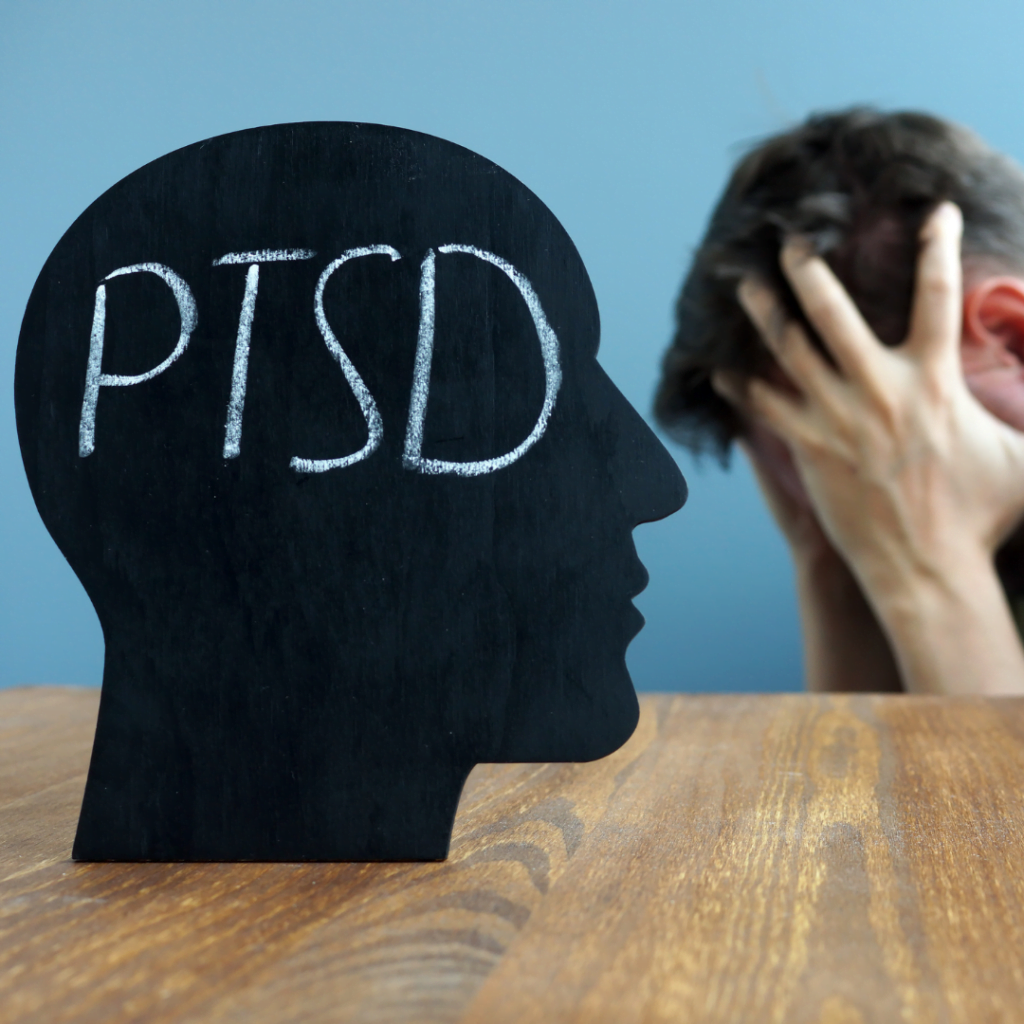
Research shows that those with PTSD have significant mental distress and anxiety. And often, stress-related side-effects could also be damaging the teeth. PTSD could even be why you’ve been grinding your teeth every night and your face feels sore in the morning. Likewise, oral health research of patients suffering from long-term PTSD revealed that these people suffer from erosion of tooth surfaces. In addition, they are also more susceptible to gingivitis, tooth plaque, and gum disease.
PTSD sufferers often exhibit increased erosion both horizontally and vertically near the gum line and biting surfaces. While it’s not completely clear, this pattern of wear may relate to teeth clenching and bruxism.
-
Product on sale
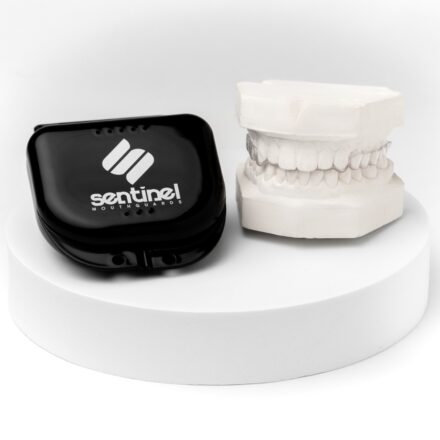 No-Show Day Mouth GuardOriginal price was: $149.00.$129.00Current price is: $129.00.
No-Show Day Mouth GuardOriginal price was: $149.00.$129.00Current price is: $129.00. -
Product on sale
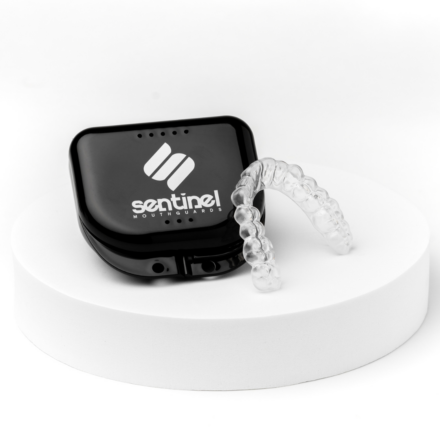 Durability Mouth Guard for Heavy Teeth GrindingOriginal price was: $215.00.$189.00Current price is: $189.00.
Durability Mouth Guard for Heavy Teeth GrindingOriginal price was: $215.00.$189.00Current price is: $189.00. -
Product on sale
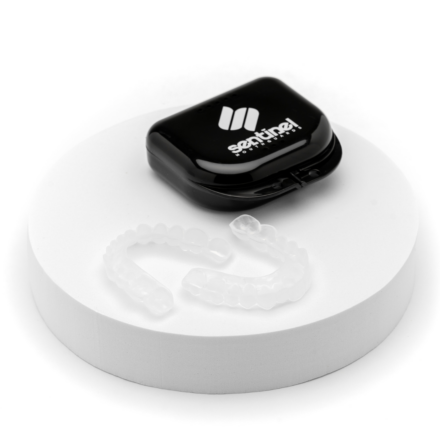 Tongue and Cheek Biting Relief Mouth GuardsOriginal price was: $189.00.$169.00Current price is: $169.00.
Tongue and Cheek Biting Relief Mouth GuardsOriginal price was: $189.00.$169.00Current price is: $169.00. -
Product on sale
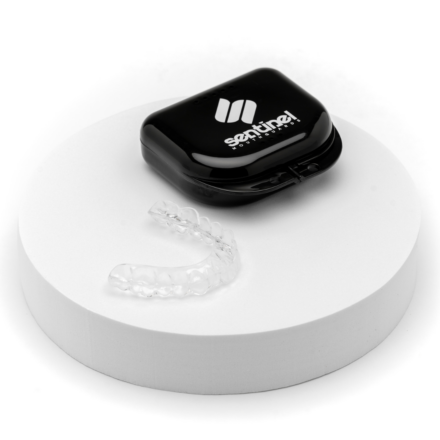 Custom Hard Night GuardOriginal price was: $169.00.$149.00Current price is: $149.00.
Custom Hard Night GuardOriginal price was: $169.00.$149.00Current price is: $149.00. -
Product on sale
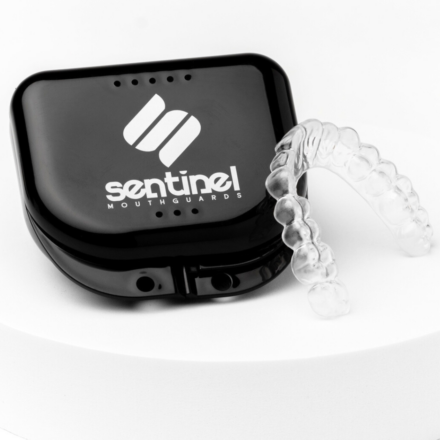 Custom Soft Night GuardOriginal price was: $149.00.$129.00Current price is: $129.00.
Custom Soft Night GuardOriginal price was: $149.00.$129.00Current price is: $129.00. -
Product on sale
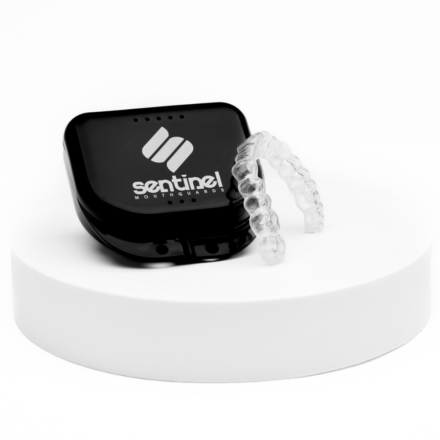 Custom Dual Laminated Night GuardOriginal price was: $169.00.$149.00Current price is: $149.00.
Custom Dual Laminated Night GuardOriginal price was: $169.00.$149.00Current price is: $149.00.
WHAT IS BRUXISM?
BRUXISM IS DEFINED AS THE GRINDING OF THE TEETH OR JAW CLENCHING THAT HAPPENS DURING SLEEP
The occurrence of some orofacial pain initiated by daytime clenching or nighttime bruxing often relates to emotional stress and anxiety attacks. In addition, 10% of the adult population dealing with this type of pain develops TMJ Disorder (temporomandibular joint disorder) or chronic orofacial pain syndrome. This can lead to tooth fracture or tooth wear.
Interestingly, many of those who suffer from bruxism have also been diagnosed with PTSD. And the type of medications used to treat PTSD often makes bruxism worse.
Interestingly, many of those who suffer from bruxism were also diagnosed with PTSD, and the type of medications they used to treat this problem often makes bruxism worse.
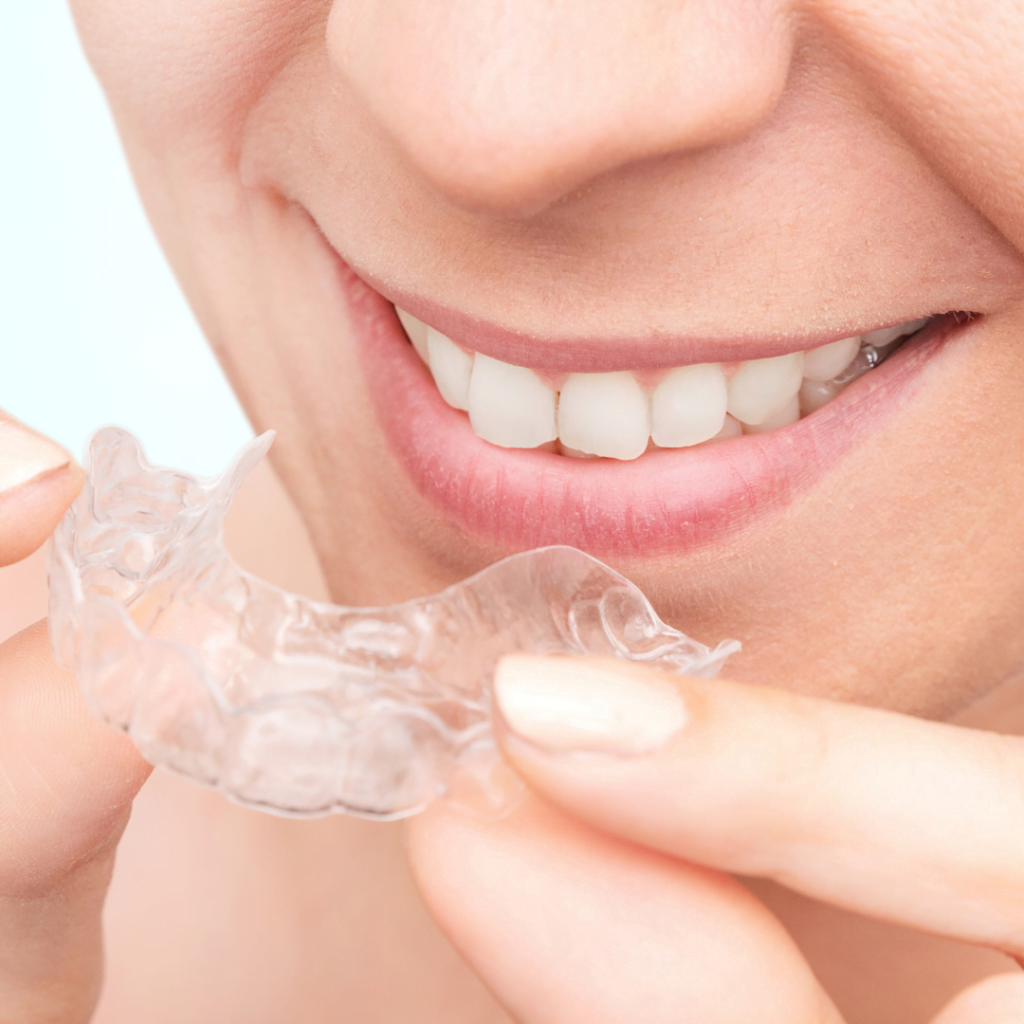
Anger
Those who deal with suppressed anger may release their stress at night by grinding their teeth. This is a natural reaction that cannot be controlled unless the anger gets eliminated during the day. So, once the person falls asleep, the mind finds outlets to release the tension brought on by anger. For some people, this leads to grinding of the teeth.
Anxiety
Anxiety comes in different forms and intensity levels. For some people, it presents as a generalized anxiety disorder. But for others, a combination of depression and anxiety creates a more complex condition. Anxiety is usually suppressed or internalized before it’s manifested outwardly. Bruxism is the brain’s way of releasing the tension caused by anxiety.
Stress
Everyone experiences stress, and it can help us avoid dangerous situations. But sometimes the stress response gets stuck on high. When that happens, a person may struggle with long term nocturnal bruxism. Others will periodically notice it at times of particular stress throughout life. Those who live with a constant high level of family, work, or financial stress are more likely to experience the effects of jaw clenching or teeth grinding.
How to Combat PSTD and Bruxism
There are numerous ways you can reduce bruxism while combating the symptoms of PSTD.
Bruxism Treatment
There are two kinds of bruxism treatments. One simply eliminates the symptoms of the disorder, but it doesn’t address the underlying cause. Conversely, working to treat the disorder itself lessens the occurrence of the symptoms and leads to other health benefits.
Treatments for PTSD (Post Traumatic Stress Disorder) & Bruxism symptoms aimed at lessening tooth pain and jaw soreness includes the following:
– Massaging the neck, jaw muscles, and face to alleviate the tension on trigger points.
– Using alternating ice and warm compresses on the jaw for 10-15 minutes a day.
– Getting physical therapy.
– Visiting a bruxism specialist or dentist.
-– Doing exercises to relax the jaw.
Treatments for PTSD (Treatments for PTSD (Post Traumatic Stress Disorder) & Bruxism designed to eliminate the symptoms include the following:
– Drinking more water.
– Reducing stress.
– Getting more sleep.
– Consciously relaxing the face and jaw throughout the day.
– Not chewing gum or other foods that fatigue the jaw muscles.
– Purchasing a mouth guard specifically made for teeth grinding.
– Avoiding caffeine.
Custom-Made Night Guards
Night guards are mouth guards worn at night to protect the teeth against grinding. This type of mouth guard is different from those worn by athletes. Wearing a night guard for grinding at night won’t usually stop the action, but it will prevent teeth damage. The appliance absorbs the grinding forces instead of allowing direct trauma to the teeth.
Jaw Exercises
Jaw exercises can be another effective way to help treat your jaw. A dentist or physical therapist can recommend more personalized exercises for you to practice. But the most common ones to try include the following:
– Using a warm compress on the jaw. Moist heat works best.
– Placing the thumb below the chin while opening and closing the mouth. The thumb should stay in place.
– Positioning the finger inside the mouth on top of the lower front teeth and letting the jaw go slack.
PTSD is a complex disorder and should be treated by a professional. However, you can try some techniques to eliminate the effects of general stress.
As for PSTD, here are some of the things that can be done:
Meditation
Meditation can be one of the best ways to lessen stress. This can be done by focusing on your breathing– breathing in and out slowly and deeply. While Meditation can be one of the best ways to reduce stress, especially by focusing on your breathing: Breathe in and out slowly and deeply. While doing this, visualize a tranquil environment like a grassy hill or deserted beach, a beautiful tree, etc. Keep it simple and note this is a practice. Be kind to yourself, and remember you’ll get better at it as you practice
Exercise
Aside from your physical wellbeing, regular exercise is also good for your mental health. Exercise helps you release your frustrations and boost your immune system. And by staying physically active, your body releases mood enhancing hormones known as endorphins. For a low impact alternative, Yoga is perfect for those with PSTD. It reduces anxiety and stress while increasing flexibility.
Prioritization
Spend your time and energy on important tasks, and try to break up larger projects into smaller ones. Give yourself a chance to celebrate small successes each day. Also, try to delegate tasks as much as possible to free up your time
Play Music
Listening to soft, calming music can lower the blood pressure and relax the mind at the same time. Better yet, play an instrument and make your own music!
Get Enough Sleep
Sleeping recharges the brain and improves your concentration, mood, and focus.
Direct Anxiety Somewhere Else
If you can, lend a helping hand to a neighbor or relative who needs a little help. You can also volunteer a little time working on community projects. Helping others takes your mind off your stress, anxieties, and worries, and it brings a special sense of purpose.
Final Words
For most people, there isn’t a permanent cure for bruxism and PSTD. But learn how to control the aspects of life you can, and you’ll likely find that both conditions can be managed. By following these useful tips, the symptoms will decrease, you’ll lower the risk of expensive dental treatment, and life will hold more joy.

